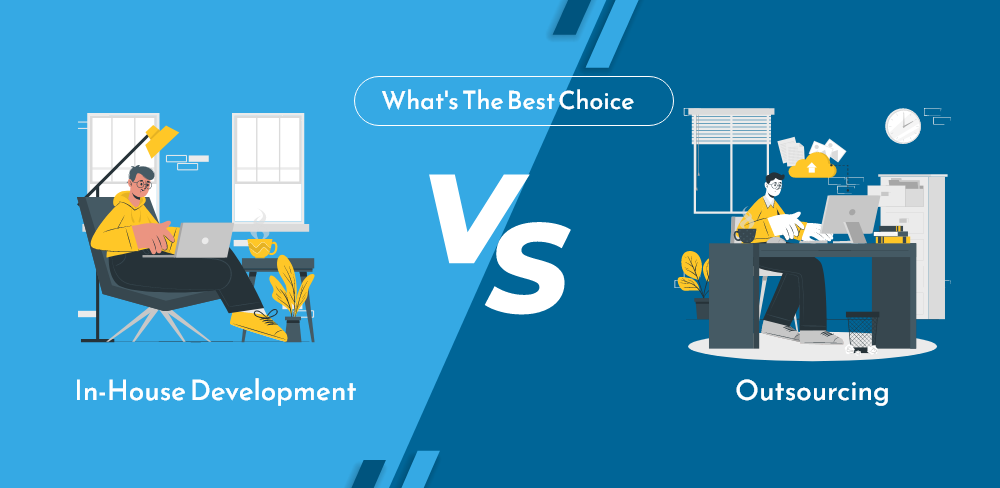The choice between In-House Development vs Outsourcing is critical in the fast-paced business world. It can have a significant impact on an organization’s ability to succeed. This blog will explore both sides of the In-House Development vs Outsourcing debate.
In-house development has the advantage of a high level of control. It allows businesses to customize solutions to meet their specific needs, maintain confidentiality, and foster a culture of innovation.
It is often associated with higher costs, resource limitations, and longer development times. Outsourcing can offer cost-effective solutions, access to specialized knowledge, and a faster time-to-market. Outsourcing can also present communication issues, quality control problems, and security risks.
We will examine project complexity, budget constraints, timelines, and long-term goals to determine the best option for your company. By the end of this article, you’ll know whether your company’s goals are better served through In-House Development vs Outsourcing.
What Is In-House Software Development?
In-house Software Development develops custom software solutions or applications within an organization using their resources. This includes in-house developers and infrastructure. Outsourcing is a different approach in which companies hire outside vendors or developers to develop software.
Software development in-house has several benefits. It gives organizations greater control over their development process. This allows them to customize solutions to meet their needs and maintain a competitive edge. Direct communication is also possible between developers and users, which allows for a better understanding of their requirements.
In-house development is a time and resource-intensive process. Organizations must invest in hiring developers and maintaining the hardware and software infrastructure. They are also responsible for all aspects of project management, including quality assurance and ongoing support.
Ultimately, the decision between in-house development and outsourcing depends on the organization’s resources, expertise, and goals. In-house development can be ideal for organizations that value customization, control, and long-term ownership. However, it takes a lot of resources and time to do well.
Advantages of In-House Software Development

Many businesses have long practiced in-house software creation, which involves a company’s developers and resources. Although outsourcing software development is becoming more popular, keeping software development internal still has many advantages, especially when considering the choice between In-House Development vs Outsourcing. This section will examine these advantages in depth, showing how in-house development can offer greater control, align with company goals, protect intellectual property, and much more.
1. More Control:
The level of control that In-House Development vs Outsourcing gives your business is one of its most important advantages. You can make decisions in real time about project priorities, direction, and resources when you have a team working for you. This control allows for greater agility in adapting to market conditions and responding to change.
2. Alignment of Company Goals
In-House Development vs Outsourcing of software development allows for a seamless alignment of the development process with your company’s goals. Your team knows your business well and can customize software solutions that meet your needs. The in-house team has a better understanding of your business, your industry, and your organizational culture. This can lead to more tailored software to your goals and objectives.
3. Customization and Innovation
In-house teams can do software development with more creativity and innovation. They can explore new technologies and ideas, create unique solutions, and experiment with different ideas. In industries where differentiation is important, this level of innovation and customization can be an asset.
4. Direct Communication
In-House Development vs Outsourcing encourages direct communication and instantaneous interaction between team members, departments, and stakeholders. This proximity can result in faster decision-making and quicker problem resolution. It also fosters a greater sense of teamwork among members. Face-to-face interactions can lead to a better understanding of the project requirements and expectations.
5. Intellectual Property Protection (IP):
You have more control over your Intellectual Property (IP) when developing your in-house software. This is especially true if the software you create is a key part of your company or you have proprietary algorithms, processes, or features you wish to protect. Outsourcing may pose IP risks as partners outside your company could have access to sensitive data.
6. Security and data privacy:
You can better control your data’s privacy and security when you develop in-house software. You can adhere more closely to industry-specific standards and implement stricter security measures. It is especially important if you are dealing with financial data, healthcare records, or sensitive customer information.
7. Rapid Response to Issues
The in-house team is better equipped to deal with issues quickly, be it software bugs, user feedback, or requirements changes. Rapid issue resolution improves user satisfaction, minimizes disruptions, and maintains software integrity.
8. Continuous Improvement:
A team of in-house developers can continually improve your software to meet customers’ and markets’ changing needs and trends. An in-house team can do regular updates, bug fixes, and feature enhancements, ensuring your software is competitive and relevant. Outsourcing partners may need help to maintain this long-term commitment.
9. Team Expertise and Knowledge Transfer:
Teams in-house develop expertise and domain-specific knowledge for your business. This knowledge will become valuable as your team members develop a deeper understanding of the industry, customers, and software architecture. Knowledge transfer is seamless within an organization, allowing for a smooth transition if team members leave or new members are hired.
10. Improved Communication with Users
Teams in-house have direct communication with users. This proximity allows developers to collect user feedback, identify pain points, and prioritize feature requests. A user-centric strategy can lead to more intuitive software aligned with customers’ expectations.
11. Cultural Alignment
Your in-house team shares your company’s values, culture, and goals. This alignment can result in better collaboration, a shared vision, and a feeling of ownership for the success of the software. Outsourced teams might have different cultural alignments. This can have an impact on communication and project understanding.
12. Cost Predictability:
Outsourcing can be cost-effective in certain cases, but in-house development is more reliable in the long run. Outsourcing can lead to unexpected costs and contract changes. On the other hand, in-house teams offer more financial stability and make budgeting and forecasting easier.
13. Retention of Talent:
A team within the company can offer better career development and growth opportunities, helping to attract and retain top talent. Companies that invest in the professional development of their developers and provide a clear path for career progression are more likely to keep them. This can reduce the costs associated with recruiting and training new employees and reduce turnover.
14. Control of Timelines
Project timelines are more in the hands of internal teams. You can adjust your schedule to meet deadlines, assign resources if necessary, and prioritize projects according to business needs. This level of control is crucial for businesses that operate in industries with rapid and dynamic changes.
15. Brand Reputation
Software developed in-house that is of high quality can improve your brand’s reputation. It shows your commitment to providing top-notch services and products to your clients, which could attract new customers and retain existing ones.
What is Outsourcing Software Development?
In-House Development vs Outsourcing – To avoid doing these tasks internally, a company will contract with an external organization or individual to design, develop, and maintain software systems or applications. This approach’s popularity is due to its potential benefits, including cost savings, access to specialized expertise, and flexibility.
In an outsourcing process, the client, also known as “outsourcer,” “buyer,” or “vendor,” collaborates with third-party vendors, usually located in another geographic region.
In-House Development vs Outsourcing, clients outline their software needs, project goals, and desired results. The service provider then puts together a team of software developers and testers to work on the project. The client can tap into an international talent pool and save money, as some countries have lower labor costs.
Successful software development outsourcing, in the context of in-house software development vs outsourcing, requires effective communication and project management since teams can be in different time zones or cultures.
Outsourcing is a strategy that allows businesses to concentrate on their core functions while using external expertise to speed up software development and delivery. It is not without its challenges. For example, data security issues and the need to have strong contracts that protect both parties’ interests are some of the most common.
Advantages of Outsource Software Development

In-House Development vs Outsourcing is now common for companies of all sizes to outsource software development. It involves hiring freelancers or external software development companies to manage specific aspects of the entire software project.
This approach can offer numerous benefits to your business. This article will examine these benefits in detail, showing how outsourcing software can improve efficiency, cost-effectiveness, flexibility, and more.
1. Cost Efficiency:
Outsourcing software development is primarily done to reduce costs. You can tap into the global talent pool to find a highly dedicated team of developers in areas with lower labor costs. This arbitrage of costs can lead to substantial savings in salaries, office space, and infrastructure. You can also negotiate with your outsourcing partners favorable payment terms, such as hourly rates or fixed-price contracts, to help you better manage your budget.
2. Talent Access:
Outsourcing companies often have a pool of highly skilled and experienced developers specializing in different technologies and domains. Outsourcing allows you to access this talent without spending time and money recruiting and training employees in-house. In-House Development vs Outsourcing Access to top talent leads to high-quality software and a faster time to market.
3. Focus on core competencies:
You can achieve significant benefits when considering the choice between in-house vs outsourcing software development. By outsourcing software development, you can focus on your core activities, allowing you to allocate your resources more effectively towards strategic tasks, rather than managing an in-house team of software developers. This strategic decision can directly influence the growth and success of your business, ultimately leading to improved business outcomes and a competitive advantage in the market.
4. Scalability and flexibility:
With an internal team, scaling up and down can be difficult. Your development team can be easily scaled up or down based on the project requirements. This flexibility is particularly useful for companies with fluctuating workloads or who want to expand their software development capability quickly.
5. Accelerated Development
You can speed up the development process by utilizing a team of skilled professionals. Outsourcing mobile app development companies often have a good understanding of Agile and other development methods, which allows them to deliver faster. They can also provide 24/7 development support to reduce development time and help you meet deadlines.
6. Risk Mitigation:
Outsourcing is a way to mitigate some of the risks of software development. In house development vs outsourcing experienced outsourcing companies typically have processes, quality assurance measures, and best practices in place. It reduces the risk of delays, budget overruns, or quality problems. Outsourcing can also give you the flexibility to adjust to market changes and project needs.
7. Access to cutting-edge technologies:
It can be not easy to keep up with the constant evolution of technology. Outsourcing companies invest heavily in infrastructure and training to remain at the forefront. Outsourcing allows you to benefit from their access to the most advanced tools and expertise. It ensures that your software will be developed with the latest innovations.
8. Global Perspective
You can gain a global perspective by outsourcing software development. Software development can be improved by working with teams of diverse backgrounds. It can result in more innovative solutions and a better alignment with global customer needs.
9. Improved Risk Management:
Outsourcing software development allows you to distribute the project risks. You and your outsourcing partner share responsibility for the project’s success. In-House Development vs Outsourcing It includes meeting deadlines, maintaining quality, and meeting deadlines. It can be particularly beneficial in complex projects, where the failure of a component can lead to a cascading impact. It also reduces the effects of unexpected issues, as you are not solely dependent on your internal resources.
10. Enhance Product Quality
When it comes to in-house vs outsourcing software development, often, outsourcing firms have strict quality assurance procedures in place. They conduct rigorous testing and quality checks to ensure the software meets user expectations and industry standards. This attention to quality can result in a more reliable, bug-free product and reduces post-launch support and maintenance costs.
11. Time Zone Advantages
Outsourcing work to teams in different time zones can be a great advantage. Your outsourcing partner can continue to develop and provide support while your team in your time zone is busy. Its “follow the sun” approach can result in faster turnaround times and better customer service, especially for businesses with a global client base.
12. Focus on Innovation
Outsourcing routine maintenance and development tasks allows your team to devote more time and energy to innovation. In-House Development vs Outsourcing The focus on innovation will lead to new products, features, or services, which can help your business gain a competitive advantage and grow.
In-House vs. Outsourcing Software Development Comparison
Outsourcing vs. In-House Development Both in-house and outsourced software development have benefits and drawbacks. The requirements of your project, your budget, and your timetable are all crucial considerations when deciding between the two. Your decision will be more informed thanks to this comparison.
In-House Software Development
Control:
You can control the entire process of development with an in-house team. You can easily and quickly make any necessary changes.
Communication:
Physical proximity can improve communication between teams. In-person meetings and collaboration between team members are easier.
Product Knowledge
Hire in house development team that will better understand the culture, goals, and requirements specific to your company. It can result in a more customized solution.
Data Security
You can take more control of data security by implementing strict security protocols.
Long-term Expertise:
Over time, in-house teams can acquire domain-specific expertise that can be useful for the ongoing maintenance and enhancement of software.
Challenges of In-House Development:
Cost:
It can be costly to build an in-house team. You must pay for salaries, office space, hire software developers, and other overhead costs.
Resources Limitations
You may find that your in-house team could be more extensive in expertise and skills, particularly if you require specialized knowledge to complete certain projects.
Time:
If you are starting from scratch, it may take more time to build an effective team.
Risk:
The organization is responsible for all costs and consequences if the project fails.
Outsourcing software development:
Cost Efficiency:
You can save money by outsourcing because you can hire outsourcing company in lower-cost areas and don’t need to invest in infrastructure or training.
Access to Global Talent
It gives you access to a larger talent pool with diverse skills and experience.
Faster time-to-market:
Due to their experience, experienced outsourcing firms can often deliver projects faster.
Scalability:
It is easy to scale up or down the development team according to the project needs without having the hassle of hiring and terminating in-house employees.
Risk Sharing:
Outsourcing involves the vendor sharing some project risks, such as meeting deadlines and maintaining high quality.
Outsourcing Challenges:
Communication Challenges:
Language and time zone barriers can make it difficult for remote teams to communicate effectively.
Quality Control:
It can be not easy to ensure a final product’s quality, particularly if you don’t closely monitor the development process.
Loss of control:
The development process is less under your direct control, which can cause you to worry about the project’s direction.
Security Concerns
If not handled properly, sharing sensitive data with a vendor outside the company can lead to security issues.
Wrapping up!
Your project needs and the organizational situation will determine whether you develop software In-House Development vs Outsourcing. Some companies choose a hybrid strategy, combining in-house and outsourced teams to balance cost, control, and expertise.
Before making a final decision, evaluating your needs, budget, and risk tolerance in the context of In-House Development vs Outsourcing is important. It is also important to do your due diligence when hire mobile app developers.
FAQs
1. What are the costs of outsourcing vs. in-house development?
Costs associated with in-house development are typically higher due to infrastructure, salaries, and training. Outsourcing is cost-effective, as it leverages lower labor costs.
2. What is the difference between control in-house versus outsourcing?
Outsourcing means giving up some control over a project to an external team, which could harm the project’s direction.
3. What are the differences between these two communication approaches?
The proximity of the team allows for easier communication. Outsourcing can be a challenge due to language barriers and different time zones.
4. Which option allows for a quicker time to market?
Due to their expertise and well-established processes, external development firms often offer a faster time-to-market.
5. What are the differences in security concerns between internal and external outsourcing?
Data security is better controlled in-house. Outsourcing raises security concerns due to sharing sensitive data with third parties, which requires robust security protocols.









